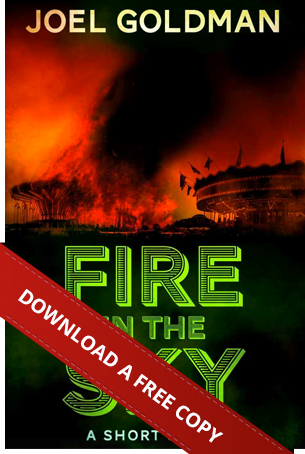The Writer’s Life – Publishing a first book
Welcome to The Writer’s Life; an ongoing discussion with crime novelist Joel Goldman about the writing craft. Becoming a published writer isn’t easy. Joel likes to say that success in publishing is like shooting a BB through a lifesaver; it may not happen. Even if it does, it can take a long time. In this episode, Joel talks about how he broke into the publishing business.
TRANSCRIPT – Publishing a first book
Interviewer:
Joel, it’s great to be with you. You were a lawyer for many years.
Joel:
Yes, I was.
Interviewer:
Now you are a fulltime writer. Tell me about how you transitioned from lawyer to writer.
Joel:
Accidentally. I started writing in the summer of 1992, almost . . . really as a joke. One of my law partners at the time came in my office and was complaining bitterly about another partner of ours, and this partner was making his life just miserable. He poured his heart out to me, and when somebody pours their heart out to you, they’re really asking you what you are going to do to solve their problem. When he finished, he looked at me expectantly and I knew I had to answer that question. I said, “Let’s just write a murder mystery. We’ll kill the son of a bitch off in the first chapter and spend the rest of the book figuring out who did it.” That’s what I did, that’s what happened.
That book I started writing that summer became my first book, ‘Motion to Kill’, which was published in 2002, making me a tenure overnight success. Then in 2004, I developed a movement disorder called tics, which is one of those neurological wonders of unknown cause and unknown cure. It’s not life-threatening or life-shortening, but it is life-annoying. It makes me shake, spasm, and stutter, and ultimately my doctors said that because of that, I could no longer practice law. I was very fortunate that I had the writing career. It wasn’t planned; it wasn’t part of some grand career arc. It was something that happened, and I’m very happy.
Interviewer:
As a lawyer, you were accustomed to writing briefs and describing factual scenarios and the like. You became a fiction writer. Was that transition difficult?
Joel:
A trial lawyer’s a storyteller. It’s a different kind of storytelling; its purpose is persuasion, but it involves gathering the facts, marshaling them, putting them in a context and a frame that’s going to be persuasive to the decider of fact. I spent years, 28 years, as a storyteller, as a trial lawyer, and I’d always been an avid reader since I was 4-years-old. I’d absorbed a lot more than I realized about the storytelling craft. It was really a pretty natural transition to move from the trial lawyer’s storytelling to the fiction writer’s storytelling.
A big difference for me, though, was that everything that I did in preparing for trial was precision-oriented, no detail left out. The worse thing that could happen to me in a trial was to be surprised by something that would happen. Something a witness would say, an exhibit that would surface; that was disaster. The essence of crime writing is surprise, not just surprising the reader but surprising myself. I found that the tools that I used in preparing for trial, that detailed, outline-driven preparation, was of no use to me as a fiction writer. The process was completely different; it was organic, dynamic. It was getting into the heads of my characters, putting them in impossible situations or challenging situations, and seeing what would happen all with a general idea towards where the story was going.
When I first started writing, I thought I would use the same tools as I did when I was getting ready for trial, and that meant an outline of everything that was going to happen. A lot of writers do that so they know before they write the first page, all those details: Who the bad guy is, how it’s going to end, and all the motivations. That didn’t work for me; it was a straightjacket. I couldn’t make it work. I start with where I think I’m going and I find out if I’m going to get there at the end. From a plot standpoint, things happen to my characters and in my stories that I never thought about at the beginning of the book. As I get to know how the characters are interacting and as I have more time to think about the storm that I’ve given birth to, then I see other ways in which the story can go.
Interviewer:
Do you have a favorite among your own books?
Joel:
That’s like asking which kid to you like the best, and the answer depends on the day. I won’t duck the question entirely. I would have to say I like ‘Motion to Kill’ because it was the first book. I like ‘Shakedown’ because it’s the most personal book to me. I like ‘Deadlock’. I’m doing it, aren’t I? I like them all. I like ‘Deadlock’ because I really like what the story was about and how that turned out. I like them all.
Interviewer:
Any other secrets?
Joel:
My mother, may she rest in peace; the first time that I finished what became ‘Motion to Kill’, I gave her the manuscript to read. She read it and she called me up, and she said, “I read your book.” I said, “Yeah? What’d you think?” She said, “It’s pretty good. I don’t really read this kind of thing, but I think it’s pretty good.” I said thanks. She said, “There’s just one thing.” I said, “What’s that, mom?” She said, “The sex scenes are a little dry.” When your mother tells you that it’s time to do some editing . . . but she was a devoted marketer of my books.
My parents decided to take my wife and me out to lunch one day for our wedding anniversary after the first book, ‘Motion to Kill’, had come out. We picked my parents up, and my mother who is a tiny little woman came walking out of their building carrying a bag of books. She gets in the car and she says, “You’ll sign the books at the restaurant, maybe somebody will notice.’ I said okay. We go to the restaurant, we’re there a little early for lunch, I sign the books; nobody notices. I put them back in the bag; put the bag under the table. A little bit of time goes by and two women come in and are seated right across from us. One of them is someone my wife and I knew, the other woman we didn’t know. I turned to this woman and I say, “Hi. I’m Joel Goldman. Here’s my card. I’m so excited. I just wanted to tell you about this new book that I came . . . my first book is published.” She responds and says her name, which I don’t remember. She looks at the card and she says, “That’s nice, but where’s my book?” I said, “Just a moment.” I reached under the table, got the bag of books, I handed this woman a book. My mother stands up and says, “That’ll be $7.47.” That’s the other little-known secret to marketing your books.
Interviewer:
Having a powerhouse of a mother.
Joel:
A powerhouse of a mother.
Interviewer:
Joel Goldman is an international bestselling crime author. His characters Lou Mason, Jack Davis, and Alex Stone wrestles with challenges the rest of us would run away from. Get to know these characters and you’ll want to come back for more. Thanks for joining us for this installment of The Writer’s Life. Additional videos about Joel’s life and work are available on JoelGoldman.com.



